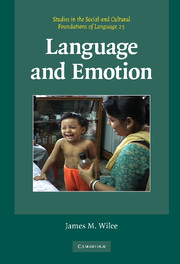Book contents
- Frontmatter
- Contents
- List of figures
- List of transcripts
- Acknowledgements
- Introduction
- Part I Theory
- Part II Language, power, and honor
- Part III Identification and identity
- Part IV Histories of language and emotion
- Notes
- Glossary
- References
- Index
- STUDIES IN THE SOCIAL AND CULTURAL FOUNDATIONS OF LANGUAGE
Introduction
Published online by Cambridge University Press: 05 June 2012
- Frontmatter
- Contents
- List of figures
- List of transcripts
- Acknowledgements
- Introduction
- Part I Theory
- Part II Language, power, and honor
- Part III Identification and identity
- Part IV Histories of language and emotion
- Notes
- Glossary
- References
- Index
- STUDIES IN THE SOCIAL AND CULTURAL FOUNDATIONS OF LANGUAGE
Summary
Feelingful language
Last year I met an exchange student I'll call Hussein, a man with a laptop, and a heart, full of songs. These were not just any songs, not secular songs, but Shia Muslim laments – songs of mourning. These songs and their compelling lyrics, along with tears and other public signs of grief over a particular set of historic martyrs, help to define Shia islam vis-à-vis other forms. In the process of interviewing Hussein it became clear that, for him, language and feeling – the subject of this book – came together in the context of Shia religious practices that pervade his life and in many ways define what anthropologists call culture (his, in this case). That is, this coming together, this fusion of language and feeling, is the very stuff of culture.
Hussein's laptop contains perhaps hundreds of mp3 files of these Shia laments. But that is not where they live; Hussein has made them a part of his life. When during the course of our interview there was a dull moment as we waited for a file to download, i found him humming. What was he humming? Another lament. This book explores language and feeling: feelingful language, like Hussein's.
Both Arabic and English versions of many Shia laments are available as downloads from Shia devotional websites. (This is a cultural story in itself but one that I will not pursue.) As Hussein played for me the English version of a lament by the popular Iraqi lamenter (composer, performer), Basem al-Karbalai, the genre ceased to be merely the object of study as its power began to move me.
- Type
- Chapter
- Information
- Language and Emotion , pp. 1 - 16Publisher: Cambridge University PressPrint publication year: 2009

